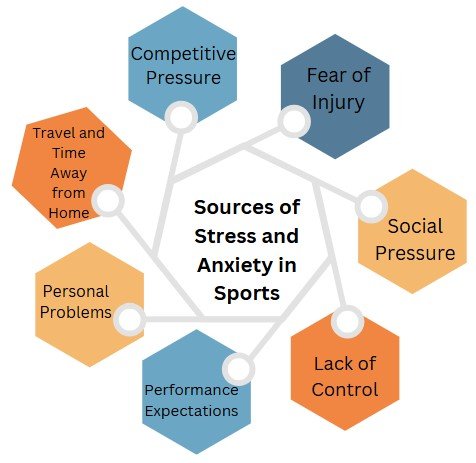Introduction
The inevitability of stressing and worrying is part and parcel of sports. It can have a bearing on the performance of an athlete, so understanding sources of stress and anxiety in sports has become essential to the betterment of the general performance of athletes and their coaches.
Sources of Stress and Anxiety in Sports
- Competitive Pressure:
- It may lead to tremendous pressure on athletes who wish to win and play at their best.
- This pressure can come out in different forms, like the fear of failure, anxiety of making mistakes, and the pressure to meet expectations.
- The intensity of competitive pressure depends on the personality of the athlete, the level of competition, and the importance of the event.
- Fear of Injury:
- In any sport, injury is the main risk associated with it; hence, such an aspect brings significant stress and anxiety to a person.
- The athletes may overthink their movements to avoid injury and become overly cautious, which leads to hindering their performance.
- The fear of missing out on important events or opportunities due to injury can add to the stress and anxiety experienced by athletes.

sources of stress and anxiety in sports
- Social Pressure:
- Athletes may experience pressure from coaches, teammates, parents, and fans to perform at a certain level.
- This can be particularly challenging for young athletes who are still developing their skills and confidence.
- It can also be manifested in the form of bullying, harassment, and discrimination. Bullying, harassment, and discrimination can have a huge negative impact on an athlete’s mental health and well-being.
- Lack of Control:
- In sports, there are numerous factors beyond the control of an athlete that influence his or her performance.
- These factors include weather conditions, opponent’s performance, and injuries.
- The lack of control over such factors can also be a stress and anxiety-provoking condition for athletes as they may not feel in control of their destiny.
- Performance Expectations:
- This occurs as an athlete sets expectations for himself, which he may not be able to meet, creating stress and anxiety.
- This can lead to feelings of disappointment, frustration, and self-doubt.
- It is important for athletes to set realistic expectations for themselves and to focus on their own performance rather than comparing themselves to others.
- Personal Problems:
- Personal problems, like relationship issues, financial issues, or health problems, can also cause stress and anxiety in sports.
- These issues would divert the concentration of athletes on their training and competition, thereby making it tough for them to focus on performance.
- Travel and Time Away from Home:
- Frequent travelling athletes on the competition tend to be affected psychologically by living far from their home and habitual environments.
- This can be very difficult for young athletes who are away from their parents and support systems.
- Travel can, in addition cause interference with sleeping patterns and regimen, which becomes a negative issue for the performance.
Read more about : Physiological, Emotional and behavioural responses to stress
Coping Strategies for Stress and Anxiety in Sports
- Relaxation Techniques:
- Relaxation techniques, such as deep breathing and meditation, can help lower stress and anxiety levels.
- These techniques can also calm the mind and body, with improved focus and concentration.
- Positive Self-Talk:
- Positive self-talk can boost one’s confidence by reducing anxiety levels.
- This will involve the substitution of negative thoughts with positive affirmations, regarding the strength and capabilities of an individual.
- Goal Setting:
- Goal setting can be able to reduce stress and anxiety since it has been proved that objectives give a sense of direction in life.
- Goals must therefore be divided into simple, manageable steps and each success is highly valued.
- Time Management:
- In time management, it is possible to reduce stress and anxiety when there is enough time for training, rest, and recovery.4
- Create a schedule that provides sufficient sleep, nutrition, and time for relaxation and socialization.
- Support
- Consultation with a coach, teammate, family member, or friend about stress and anxiety can help in terms of emotion and feelings.
- They can give support and counseling and assist in the development of coping skills.
- At times, they may require a professional approach with the help of a sports psychologist or therapist.
- Mindfulness:
- Mindfulness is the act of focusing on the present without judgment.
- It can help to reduce stress and anxiety by increasing awareness of one’s thoughts and feelings.
- There are many mindfulness practices that can be incorporated into daily life, such as meditation, yoga, and mindful breathing.
Conclusion
Stress and anxiety are certainly common experiences in sports, yet they don’t necessarily have to damage an athlete’s performance and well-being. Understanding sources of stress and anxiety and implementing effective coping strategies can help athletes learn how to manage these challenges and lead to their full potential.
References
– Cox, R. (2006). Sport Psychology. McGraw-Hill Education.
– Jarvis Matt (2006). Sport Psychology : A student’s Handbook. Routledge.
Subscribe to Careershodh
Get the latest updates and insights.
Join 13,984 other subscribers!
Niwlikar, B. A. (2025, February 20). Sources of Stress and Anxiety in Sports. Careershodh. https://www.careershodh.com/sources-of-stress-and-anxiety-in-sports/
